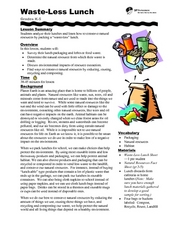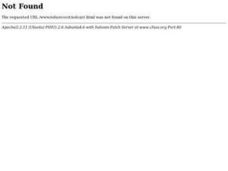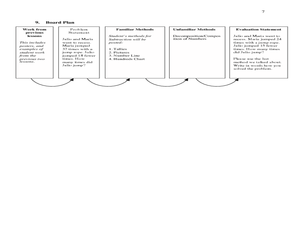Curated OER
Growing Vegetable Soup
Learners use children's literature in order to think about the concept of creating a garden. This is done through conducting simple research about types of plants that could be grown in the area and how to care for them. Then the garden...
Curated OER
"Leaf" It in Your Yard
Young scholars research about the process of composting. Students apply their research by creating a compost pile at school that will be maintained once or twice a month for the remainder of the school year.
Curated OER
Reduce, Reuse, Recycle and Compost
Students expand their understanding of solid waste management. They examine the effects of packaging decisions. They study engineering advancements in packaging materials and solid waste management.
Curated OER
Molehill or Mountain
Students explore the concept of waste management. In this environmental stewardship lesson, students consider the trash generated by people per day and discuss what steps they can personally take to reduce waste.
Curated OER
Worm Posters Presentations and Worm Box Part 2
Students work in small groups to investigate the topic, make a visual aid, and present to the class. They are given the following four topics: Worms and other decomposers, taking care of a worm box, waster and recycling, and...
Curated OER
A Worm World
Students maintain a compost bin and build a worm observatory. They design experiments relating to worms and record observations in a worm journal.
SF Environment
Waste-Less Lunch
Is it possible to have a waste-less lunch? Can your class become leaders in conservation? Discuss the importance of reducing waste during lunch time with a fun lesson that can be extended to everyday practices. First the class examines...
Curated OER
Dinnertime for Animals
Is a deer an herbivore? What about a spider? Experiment with the food chain in an interactive science experiment. After listing the herbivores from a selection of animals, third and fourth graders compare the skulls and teeth of...
Curated OER
The Trash We Pass
Where does our garbage go? What is the difference between a recyclable and non-recyclable item? Pose these important, but often overlooked, questions to your class and invite them to consider the lasting and damaging effects of the...
Curated OER
Recycling Garden Waste
Students experience how to make compost. This lesson is ongoing with periodic checks and maintenance. They select a piece of ground around the school or around their homes to establish a compost pile. Organic materials are utilized...
Curated OER
Recycling: The Way to Save...Fad or Fact
Students write stories about recycling and illustrate them. They examine various containers and determine whether or not they are recyclable. They make a chart about the containers and visit a recycling center.
Curated OER
Cows, Worms, and Compost
Learners study decomposition. In this decomposition lesson, students discuss the background information about decomposition. Learners then complete the 'Chew It Twice' worksheet.
California Academy of Science
Where Do I Put My Trash?
Where does the trash go after you put it in the garbage can? The class discusses sustainability, recycling, compost, and landfills as they play as fun relay game. In teams, they race to be the fastest group to successfully sort...
Curated OER
Starch Yer Thinkin' About Corn Products
Seventh graders study the parts of corn and explore the role of starch. In this corn products lesson students prepare a model of water and stones.
Curated OER
Gardening with Your Students
By growing a class or school garden you can teach students about the environment, the life cycle of a plant, and healthy eating.
Curated OER
Organic and Inorganic Recycling
Students examine their role in polluting the environment and discuss the importance of recycling. In groups, they place earthworms into compost piles to observe why they are considered natural recyclers. They also practice sorting a...
Curated OER
Recycling & Our Environment
Students present information about recycling to other students. In this environmental protection instructional activity, students create a puppet show or commercial about the importance of recycling for other students to view.
Curated OER
Layers of the Forest- Leaf Litter
Students conduct an experiment. In this temperate forest lesson, students discuss what kind of animal life can be found in the forest. They read The Magic School Bus Meets the Rot Squad: A Book About Decomposition and complete an...
Curated OER
Causal Patterns in Ecosystems Section 3
Students design and create a worm and worm free compost tanks for observation of decay in ecosystems. They make predictions, care, and revist tanks using their journals for observation and data collection.
Curated OER
Can Worms See?
Second graders discuss the previously created worm compost and the importance of living creatures to the Environment. In this worm lesson, 2nd graders observe worms and record their sensitivity to light. Students design a petri...
Curated OER
Mathematics Lesson Plan
Second graders study subtraction facts. For this mathematics lesson, 2nd graders discuss how to solve two digit subtraction problems. Students recognize that there are many different methods or strategies one can use such as using...
Curated OER
WHAT'S ORGANIC?
Middle schoolers explore how certain foods come to be certified "organic." They write the words "organic" and "synthetic" and given the definitions of each. Students are given dictionaries. They are asked: "What is organic food?" Middle...
American Museum of Natural History
Grow Rock Candy
The best way to study crystals is to make your own! A hands-on lesson shows learners how to make their own rock candy from household materials. While they watch the crystals grow, they discover their structure and can even eat their...
Curated OER
Reuse and Respect!
Young scholars examine the concept of reusing trash to save the environment. In this environment lesson, students examine the definition of the word reuse, and apply it by finding ways to reuse trash in their school. They talk about what...

























